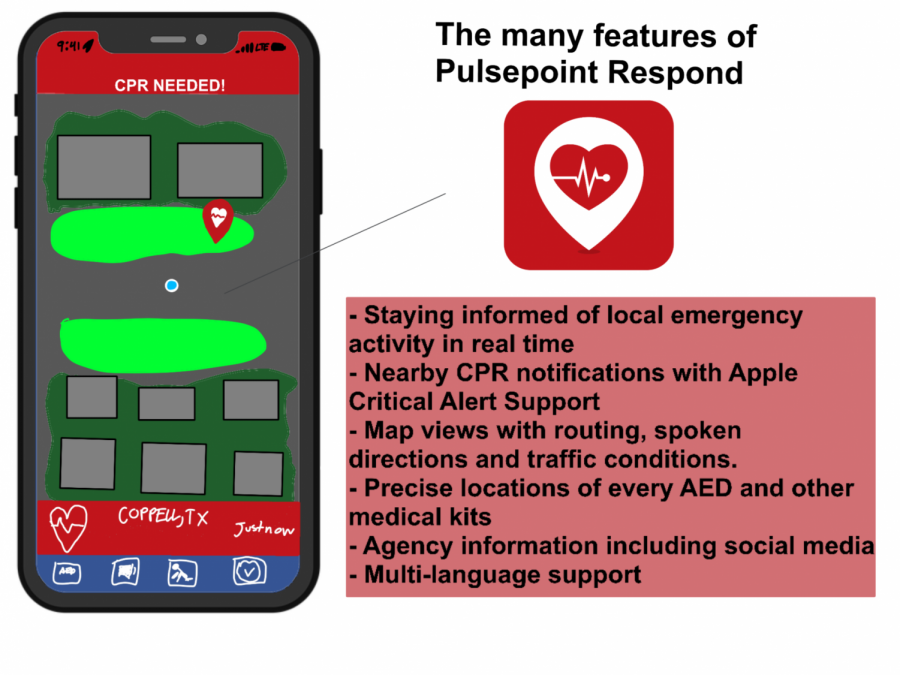Contemporary app lets everyday citizen perform CPR to save lives
The City of Coppell has implemented Pulsepoint, a medical app that allows people to respond to cardiac emergencies, permitting them to perform proper CPR before emergency services arrive and be informed of all activity from local emergency services. The app also includes precise locations of AED and other medical kits that may be needed for severe health conditions.
February 25, 2020
Becoming CPR certified may seem like one of those “in case of emergency” preparations that many will never use. However, with the implementation of PulsePoint in Coppell, being CPR certified provides the opportunity for the everyday citizen to give lifesaving assistance.
PulsePoint rolled out to Coppell on Dec. 4. CPR-trained citizens and off-duty public safety or medical professionals can download this mobile app and receive notifications if an individual in the proximity has a cardiac emergency. Before emergency services arrive, trained individuals with the app can provide CPR.
“PulsePoint empowers citizens to react in emergency situations,” Life Safety Park manager Jeana Lantiere said. “The goal is someone can respond to the incident before emergency responders. Even though [Coppell] has a quick response time, for every minute someone in cardiac arrest doesn’t get CPR, his or her chances of survival decreases by 10 percent.”
Users do not need to input a certification number or card to utilize the app, but simply state they are eligible to perform CPR. PulsePoint also includes step-by-step CPR instructions with a metronome setting the tempo for at least 100 compressions per minute.
“What I’m learning in my EMT class is you never know when you have the chance to save someone’s life,” EMT-in-training 2019 Coppell High School graduate Alex Patrick said. “Learning how to do CPR was a short course for me; it didn’t take really long. Taking the course is definitely worth the ability to save someone’s life. At any time someone can come down with cardiac arrest, and it’s good to always be prepared. Being CPR certified is a really good skill for anyone to have.”
While there have been cases in Coppell where users of PulsePoint have received an alert someone nearby was in cardiac arrest, emergency services have consistently arrived prior.
PulsePoint also has a sister app, PulsePoint AED, where users are able to locate any AEDs they see in their area, allowing for a log of all the surrounding AEDs in case of cardiac emergency.
In case of cardiac emergency, CPR is the most, if not only, effective method in sustaining someone’s life who is in cardiac arrest before trained professionals arrive.
“Yes, you want to call 911, and you want the paramedics on the scene with all the bells and whistles,” CHS health science teacher Gary Beyer said. “But there’s only one proven fact about someone in cardiac arrest: that doing chest compressions, to this day 50 years after CPR started, is the only thing that’s proven to help sustain someone’s life long enough for definitive care to take over.”
The Coppell Fire Department offers monthly CPR/AED classes at Life Safety Park to train residents.
“I encourage everybody to sign up for a CPR class even if they’ve had CPR training in the past,” Lantiere said. “Go ahead and take the class once a year to refresh those skills and gain the ability to potentially save someone’s life.”
Follow Karen (@_karenlu_) and @CHSCampusNews on Twitter.












